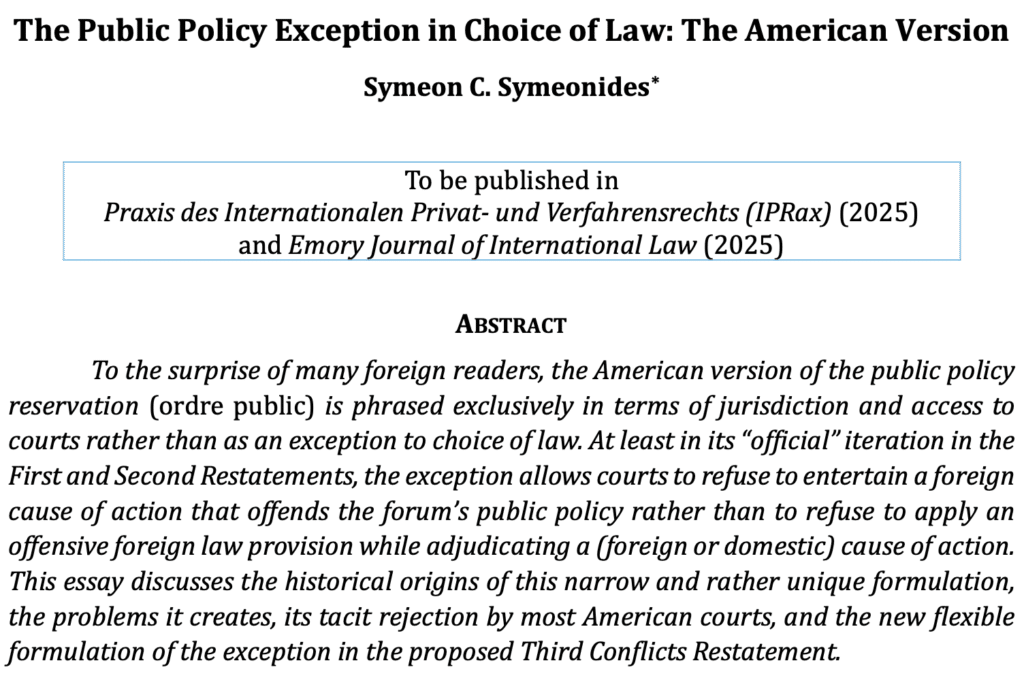Demystifying Borrowing Statutes
A borrowing statute is a law directing the courts in one jurisdiction to “borrow” the shorter statute of limitations of another jurisdiction. Borrowing statutes are common in the United States—thirty-six states have enacted them—but they are largely unknown in the rest of the world. In this post, I seek to demystify borrowing statutes for the…
Continue ReadingNinth Circuit Addresses Common Law Immunity from Criminal Prosecution
Two years ago, in Turkiye Halk Bankasi A.S. v. United States (Halkbank) (2023), the U.S. Supreme Court held that the Foreign Sovereign Immunities Act (FSIA) does not apply to criminal proceedings and remanded the defendant’s claim of common law immunity to the Second Circuit. On remand, the Second Circuit deferred to the executive branch’s determination that Halkbank was not…
Continue ReadingDismissal for Forum Non, With Two Alternative Fora?
The Fourth Circuit recently considered whether dismissal for forum non conveniens is appropriate if the case would have to be bifurcated and heard in two separate courts in the country that provides an alternative forum. In AdvanFort Co. v. Zamil Offshore Services Co., the court answered “yes,” with one judge dissenting. This might have been…
Continue ReadingFederal Court Issues Worldwide Anti-Enforcement Injunction
Last month, Judge Edward Davila (Northern District of California) granted a motion by Google for a rare type of equitable relief: a worldwide anti-enforcement injunction. In Google v. Nao Tsargrad Media, a Russian media company obtained a judgment against Google in Russia and then began proceedings to enforce it in nine different countries. Arguing that…
Continue ReadingWhen Is a Securities Transaction “Domestic” Under Morrison?
In Morrison v. National Australia Bank (2010), the Supreme Court held that § 10(b) of the Securities Exchange Act applies only to “transactions in securities listed on domestic exchanges, and domestic transactions in other securities.” This holding doomed the securities fraud claims in Morrison because the plaintiffs purchased their shares on the Australian Securities Exchange….
Continue Reading$29.8 Million Judgment in First-Ever Helms-Burton Jury Trial
A Cuban-American plaintiff has won a major jury verdict in the Southern District of Florida against four corporate defendants associated with Expedia Group. The case involves an island off the coast of Cuba, which the plaintiff, Mario Echevarría, claimed was expropriated from his family in 1959. The defendants provided digital platforms that allowed travelers to…
Continue ReadingForum Selection Clauses in California
In 2024, more than 1.2 million civil lawsuits were filed in California. While most of these suits were between U.S. residents, some of them grew out of international contracts. Some of these international contracts, in turn, contained forum selection clauses choosing the courts of a foreign country. In this post, I take a close look…
Continue ReadingNew Article on the Public Policy Exception to Choice of Law
In every private international law system, the forum state reserves the right to reject the application of a foreign rule that deeply offends the forum’s fundamental sense of justice and fairness. In all systems, this “public policy reservation” (ordre public) operates as an exception to the forum’s choice-of-law rules, not its rules on jurisdiction or…
Continue ReadingEnforcing Foreign Judgments in Non-Uniform Act States
The recognition and enforcement of foreign judgments in the United States are generally governed by state law. Most states have adopted one of two uniform acts to address this. Twenty-nine states and the District of Columbia have adopted the 2005 Uniform Foreign-Country Money Judgments Recognition Act. Nine additional states still rely on its predecessor, the…
Continue ReadingIs It Too Dangerous To Litigate In Israel?
Many international contracts contain forum selection clauses stating that litigation must occur in the courts of a particular country. While these clauses provide a welcome measure of certainty as to where future disputes will be resolved, they are sometimes viewed as inconvenient by plaintiffs who would prefer to sue in the United States. In an…
Continue Reading







